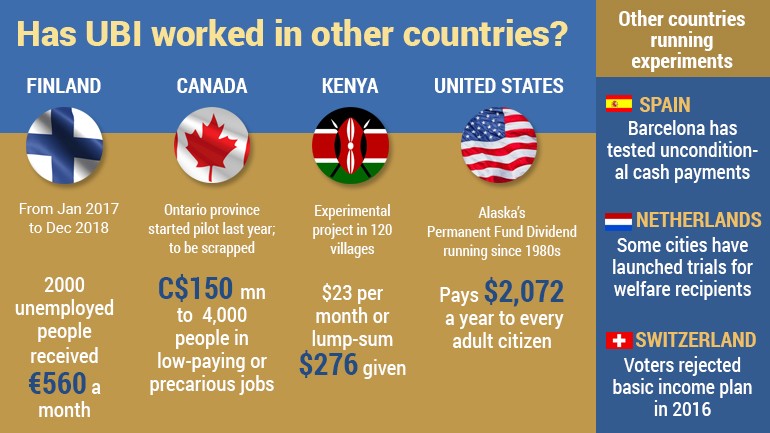Ahmedabad
(Head Office)Address : 506, 3rd EYE THREE (III), Opp. Induben Khakhrawala, Girish Cold Drink Cross Road, CG Road, Navrangpura, Ahmedabad, 380009.
Mobile : 8469231587 / 9586028957
Telephone : 079-40098991
E-mail: dics.upsc@gmail.com

Universal Basic Income
News: Recently, Chief Economic Advisor V Anantha Nageswaran said the concept of Universal Basic Income (UBI) was not necessary for India since natural economic growth would take care of the country’s many aspirations.
Background:
• The discussions on UBI is a never-ending topic. Former CEA Mr. Arvind Subramanian had proposed it as a “conceptually appealing idea” in Economic Survey 2016-17.
What is UBI?
• UBI is a social welfare proposal in which all citizens of a given population regularly receive a guaranteed income in the form of an unconditional transfer payment, without a means test or need to work. It would be received independently of any other income.
• The goals of UBI are to alleviate poverty, reduce inequality, and provide economic security and freedom for all.
What are the advantages of UBI?
• UBI reduces poverty and income inequality by providing a guaranteed income to all citizens, regardless of their earnings or employment status. For example, UBI trials in Brazil, Namibia and Kenya have shown positive effects on poverty reduction, food security, health etc.
• UBI improves physical and mental health by enabling people to afford basic needs, access health care, improve sanitation, reduce stress, and enhance happiness and life satisfaction.
• UBI provides individuals with financial security and greater freedom to make choices about their work, education, and personal lives. For example, UBI has led to increased school enrollment, attendance, families have spent more time with their children.
• It can drive economic growth as money is directly given in the hand of individuals. It can urge people to buy more, enhance local businesses and generate employment opportunities as well.
What are the disadvantages of UBI?
• It is too expensive and unsustainable for most countries, especially if it is set at a level that meets basic needs.
• UBI would require higher taxes, cuts in other public spending, or increased public debt.
• It removes the incentive to work, adversely affecting the economy and leading to a labor and skills shortage.
• UBI could reduce work effort, productivity, and innovation, as well as increase dependency and complacency.
• It can lead to Inflationary tendencies.
• It is socially unjust and unfair to the poor and the workers who contribute to society. It has the potential to reduce social solidarity and cohesion by weakening the link between rights and responsibilities.
Are there any alternatives to UBI?
• Universal Basic Services (UBS) - This is the idea of providing free or low-cost access to essential public services such as health care, education, transport, housing, and digital communication.
• Minimum Income Guarantee (MIG) - This is the idea of providing a means-tested cash transfer to people whose income falls below a certain threshold. MIG aims to prevent extreme poverty and ensure a decent standard of living for all.
• Direct Benefits Transfer (DBT) – Transfer cash or subsidies directly into bank accounts of beneficiaries. Eg – PM Kisan, Jan Dhan Yojana etc, KCC
• Other alternatives such as Conditional Cash Transfers, Employment Guarantee schemes, providing skilling opportunities.
Way Forward
• For countries such as India the UBI may not always help and CEA V Anantha Nageswaran suggested that natural economic growth should take care of many of the aspirations of people.
• When Finland adopted UBI experiment for a 2-year period on about 2000 unemployed people it found that UBI did not significantly boost employment, but it did improve self-reported happiness, health and trust.
Source – Indian Express, India Today, neweconomics.org

Address : 506, 3rd EYE THREE (III), Opp. Induben Khakhrawala, Girish Cold Drink Cross Road, CG Road, Navrangpura, Ahmedabad, 380009.
Mobile : 8469231587 / 9586028957
Telephone : 079-40098991
E-mail: dics.upsc@gmail.com
Address: A-306, The Landmark, Urjanagar-1, Opp. Spicy Street, Kudasan – Por Road, Kudasan, Gandhinagar – 382421
Mobile : 9723832444 / 9723932444
E-mail: dics.gnagar@gmail.com
Address: 2nd Floor, 9 Shivali Society, L&T Circle, opp. Ratri Bazar, Karelibaugh, Vadodara, 390018
Mobile : 9725692037 / 9725692054
E-mail: dics.vadodara@gmail.com
Address: 403, Raj Victoria, Opp. Pal Walkway, Near Galaxy Circle, Pal, Surat-394510
Mobile : 8401031583 / 8401031587
E-mail: dics.surat@gmail.com
Address: 303,305 K 158 Complex Above Magson, Sindhubhavan Road Ahmedabad-380059
Mobile : 9974751177 / 8469231587
E-mail: dicssbr@gmail.com
Address: 57/17, 2nd Floor, Old Rajinder Nagar Market, Bada Bazaar Marg, Delhi-60
Mobile : 9104830862 / 9104830865
E-mail: dics.newdelhi@gmail.com